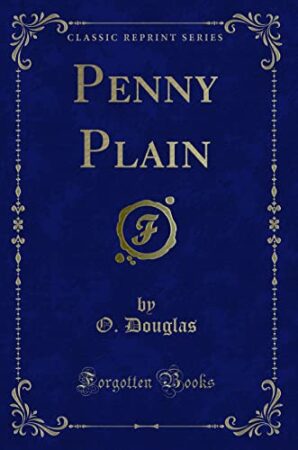
John Buchan was one of those characters, larger than life. He was an author and a statesman, and profoundly Scottish. He was the son of a Scots Presbyterian minister, and is probably best known today for his book The Thirty-Nine Steps, published in 1915 That book was the first of six Richard Hannay novels—spy thrillers. This first book was later made into a movie by Alfred Hitchcock. At the same time, when he wasn’t writing novels, he was doing other stuff, like being the Governor-General of Canada (1935-1940).
I bring all this up because he had a younger sister, Anna Masterton Buchan, who wrote novels under the pen name of O. Douglas. Not only was John Buchan one of those characters, but he came from one of those families. O. Douglas wrote about fifteen books, most of them light romances set in small towns in Scotland. My mother was a dedicated fan of her O. Douglas books, and a few years ago my wife Nancy began working through the books as something of a tribute to my mom, and has been enjoying them. As I recently had something of an epic plane ride to Brazil, I took the opportunity finally to read one for myself. The one I chose to read was Penny Plain, and I would like to commend it to you.
Let me give you four reasons to check them out, starting with this one.
The first is that these stories, set against the backdrop of Scotland after the First World War, gives a real sense of what living in a still-functioning Christendom was like. If you wanted to keep your daughters from reading modern dreck about how all the lesbians in middle school kept fighting with each other and calling one another catty names, then give one of these a try. These books are wholesome, right-side up, and very pleasant.
The second reason is that while O’Douglas was not the same kind of fierce Calvinist that her ancestors were, she was at the same time fiercely loyal to that heritage. This comes out in various ways, all of them enjoyable. At least to Calvinists.
The third thing is this. I said above they were light romances set in small towns, and perhaps your reaction ran along the lines of “shoot me now.” But one of the things she does really well is provide a line of character sketches of various individuals in this small town. And to modify something Chesterton said, there are no uninteresting people, just uninterested people. Her character sketches are filled with shrewd insights about all the very different kinds of people. There is some really solid humane wisdom there.
And last, she is a thoroughly educated woman writing for a popular audience, and she really knows how to write. Reading her is like reading Wodehouse. I don’t read Wodehouse for the plots, which are all remarkably similar—I read him for the striking metaphors and descriptions that are found on page after page. O’ Douglas is like that.
“You actually described the high-priestess as looking like a ‘decomposing cod-fish,’ and added by way of final insult that you thought the woman had a kind heart.”
“I am going to walk on the hills all day, and in the evening I shall read the Book of Job and Shakespeare and Sir Walter.”
“the Bathgate family—decent, well-living people, but plain-headed to a degree.”
“the bed was as hard as the nether millstone”
“The beds and chairs and cushions are all stuffed with cannon-balls.”
“While Peter [the dog] sat himself on the rug to await developments.”
“She hasn’t that Now-I-am-going-to-be-charming manner that is so difficult to bear.”
[Speaking of swapping out a looking glass] “‘The other one,’ she complained, ‘made me look pale green and drowned.'”
In short, I think the chances are good that somebody in your household would enjoy reading this one. You could have them report back.

